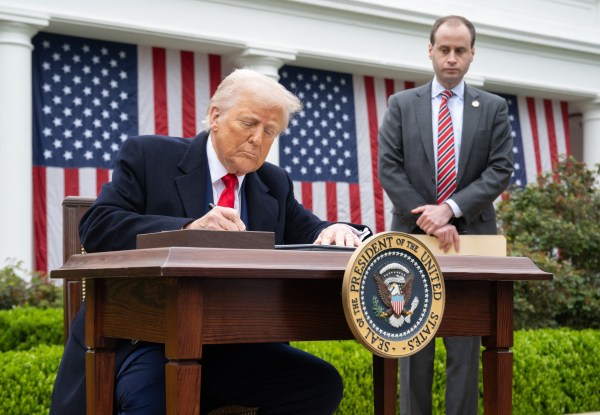House Democrats went into the 2020 election expecting to pick up more than a dozen seats. Instead, they lost just about every toss-up race and will begin the 117th Congress with the smallest House majority either party has held in two decades.
The new dynamic will force Democratic leaders to change their tactics, both in drafting bills and in reining in the rank and file. Members and experts say House Speaker Nancy Pelosi is likely to impose an even more top-down, predetermined process than the chamber has seen in recent years.
Yet the math also serves to empower individual lawmakers in this way: The margin for success on partisan legislation will be only a few Democrats. Any handful of like-minded Democratic lawmakers will be able to band together in a small faction and insist that their priorities be reflected.
“The slimmer margin, it cuts both ways,” Rep. Alexandria Ocasio-Cortez of New York told The Dispatch last week. “It’s tough because we have to make sure that we cobble together a winning majority, but also it’s solid because we’re able to push a little bit more.”
Asked how willing she and her fellow progressives are to take advantage of the numbers to shape legislation, Ocasio-Cortez said it will be important for members “to not pull that trigger on a consistent and very sensitive basis.”
“But,” she added, “I do think that it gives us leverage to use that when it’s absolutely necessary.”
The situation has set up the House as a battlefield for the larger war over the direction of the Democratic party, especially as members anxiously look toward the 2022 midterms. It will also pare down the ambitions of a caucus that had hoped to implement sweeping change under the new Joe Biden administration.
Budget Committee Chairman John Yarmuth of Kentucky said it will be “very, very difficult” to advance a legislative agenda in the House. “There’s no way to sugarcoat it. I don’t know how we do anything significant,” he told The Dispatch during a brief interview at the Capitol.
Perhaps the first casualty will be a Democratic budget. That won’t mean much in terms of legislating; congressional budgets are little more than press releases. But in all likelihood, the casualties won’t just stop there.
“The big picture is, I mean, there’s no chance we get anything done on immigration,” Yarmuth said. “There’s no chance. It’ll be even difficult to do infrastructure.”
Biden ran on a more moderate platform than most of his Democratic competitors, but he still had plans to advance a public option for Obamacare, pass a sprawling infrastructure bill, and take on immigration.
Now, with a likely Republican Senate and a barely Democratic House, he’ll be lucky if he can get a new coronavirus relief bill and keep the government running.
“Unless President Biden has a very powerful soapbox and uses it, and is able to use it effectively,” Yarmuth said, “I don’t know.”
Democrats are expected to hold 222 seats in the new Congress—just a few members more than the 218 needed for a House majority. Two districts are still too close to call, but results in both have favored the Republican candidates so far.
Republican Claudia Tenney has a razor-thin lead over incumbent Rep. Anthony Brindisi in New York’s 22nd Congressional District, and Republican Mariannette Miller-Meeks has been certified as the winner of Iowa’s 2nd District by a mere 6 votes. Given the closeness of the two races, disputes could keep these seats unfilled after the House convenes in January. If the two Republicans do hold onto victory, the party breakdown would be 222-213.
Add to that concerns about current House Democrats leaving the chamber to serve in the Biden administration: Reps. Cedric Richmond and Marcia Fudge are both set to depart after Inauguration Day, depleting Democratic ranks even further.
While this complicates things for leadership, the math doesn’t change too much yet, depending on whether any more Democrats decide to leave for greener pastures. The number of members needed for a majority goes down when there are vacancies. A House breakdown of 220-211 with four vacancies (counting the two close races and the two Democrats we know are leaving) means 216 members will be needed for a majority.
In any case, House Speaker Nancy Pelosi will be working with a margin of only a handful of Democratic votes, even after Richmond’s and Fudge’s reliably blue districts elect new representatives.
Democrats will have to be almost completely unified to pass any legislation that Republicans are opposed to—including many agenda items sought by the Biden White House and the kinds of messaging bills Democratic leaders have brought forward over the past two years. Unifying a caucus that has already been clashing over its message and priorities will be a challenge, to say the least.
“This is really like a party branding issue,” Josh Huder, a senior fellow at Georgetown University’s Government Affairs Institute, told The Dispatch. “What do moderates feel is in their best interest? What do progressives feel is in their best interest? And the goal of leaders is to sort of thread that needle, which is going to be really, really tough given the small vote threshold that they’re dealing with.”
Democratic leaders are considering how best to go about that task. House Whip Jim Clyburn told reporters there will be “significant changes” in how leadership conducts business in the new year.
“When you’ve got 20 votes to spare, it’s a little different when you’ve only got two,” Clyburn said. “So you make that adjustment, go from bill to bill. It’s not going to be any one standard thing.”
Michigan Rep. Dan Kildee, a chief deputy whip for the Democratic Caucus, acknowledged the numbers “could constrain us a bit” and said there will be more of a focus on including members in the drafting process early on to make sure varying perspectives are addressed.
“We’re going to have to really work hard to have a lot of voices in the room as things are being put together,” he said.
At least in the beginning, Democrats could prioritize uncontroversial, bipartisan measures, which already make up a large portion of what the chamber deals with on a day-to-day basis. These could address issues members overwhelmingly agree on, such as human rights in China.
House Majority Leader Steny Hoyer told reporters recently he is urging committee chairs and Democratic leaders to work in a bipartisan fashion to advance legislation that has broad support in the new Congress.
But top Democrats are also eyeing procedural moves to keep the slim majority unified more easily—further tightening Speaker Pelosi’s grip on the legislative process. The party is considering a House rules change to roll back or reform the “motion to recommit,” according to Hoyer.
Motions to recommit are the minority party’s last chance to amend a given bill before a vote on final passage. The MTR is a rare moment for spontaneous deliberation in a chamber that is almost always restricted to House leadership’s whims today.
Under former House Speaker Paul Ryan, Republicans broke records for shutting down floor debate, relying almost exclusively on closed rules when considering legislation. Closed rules block members from offering amendments from the floor. House Speaker Nancy Pelosi has continued that approach in the 116th Congress. The motion to recommit, in today’s extraordinarily closed House, is effectively the only opportunity for all members to debate and vote on amendments that haven’t been approved by the House Rules Committee beforehand.
But instead of using this tool for good-faith legislating, the minority party often uses it to highlight divisions in the majority and to force vulnerable members to take tough political votes. Both parties have been guilty of this tactic—and majority leadership always urges their members to ignore the game and simply vote against the motion to recommit at all times. These votes almost always fail on party lines.
In the most recent session, though, Republicans successfully peeled off enough Democrats from red districts to advance several motions to recommit.
For instance, more than two dozen Democrats, many of whom were gearing up for tough reelection fights at the time, voted for a GOP motion to recommit on a bill to expand background checks for gun sales last year. The Republican language would ensure Immigration and Customs Enforcement is notified in the event that an undocumented immigrant fails a background check when trying to buy a firearm.
Republicans knew the overall legislation wouldn’t become law, and most didn’t support it on final passage, but their amendment did cause strife among Democrats. Progressives and Democratic leaders were unhappy with the change, and Speaker Pelosi reportedly admonished members for siding with Republicans.
With a slimmer Democratic majority, the potential for successful MTRs is even greater.
House Minority Leader Kevin McCarthy has slammed the prospect of limiting motions to recommit, saying Democrats want to “overturn centuries of precedent just to protect their own political futures.”
Democrats say they still haven’t made up their minds on how exactly they’ll address the tool in the upcoming rules package—whether to impose new restrictions or get rid of it altogether. Either way, the move will serve to strengthen House leadership’s hand even further, in an already historically leadership-driven chamber.
“Honestly, if they gut the motion to recommit in the ways that they say they kind of plan on tinkering with it, we’re talking about a speakership—not just Pelosi, but the institution of the speakership—being more powerful than it’s arguably ever been outside of 100 years ago, and maybe not even then,” Huder said.
“We may see a once-in-a-century top-down process in the House in this upcoming Congress, just given the political conditions and the size of the majority,” he added.
Rep. Justin Amash, the Michigan Libertarian who left the Republican Party last year, echoed those concerns.
“To the extent it’s top-down right now, it will be even more top-down next Congress,” he told The Dispatch.
Amash did not run for reelection and is set to leave the House in January. He spent much of his five terms railing against congressional leaders from both parties for keeping members out of the legislative process.
He said there are many new, younger Democrats who care about opening up the process—like Ocasio-Cortez, for example—but he is skeptical any real effort to push back on Pelosi will pick up steam.
“They need to have a peaceful revolution,” he said when asked if he has advice for Democrats in the upcoming Congress. “I would say, ‘You should refuse to participate in the current system. Don’t give them a quorum.’ Like, literally if you had enough members who said, ‘Enough is enough. We’re just done with the system,’ you could get it to change.”
“But the problem is, that has to be led by people in the majority party, right?” he added. “And the people in the majority party are always super scared of their own leadership.”






Please note that we at The Dispatch hold ourselves, our work, and our commenters to a higher standard than other places on the internet. We welcome comments that foster genuine debate or discussion—including comments critical of us or our work—but responses that include ad hominem attacks on fellow Dispatch members or are intended to stoke fear and anger may be moderated.
With your membership, you only have the ability to comment on The Morning Dispatch articles. Consider upgrading to join the conversation everywhere.